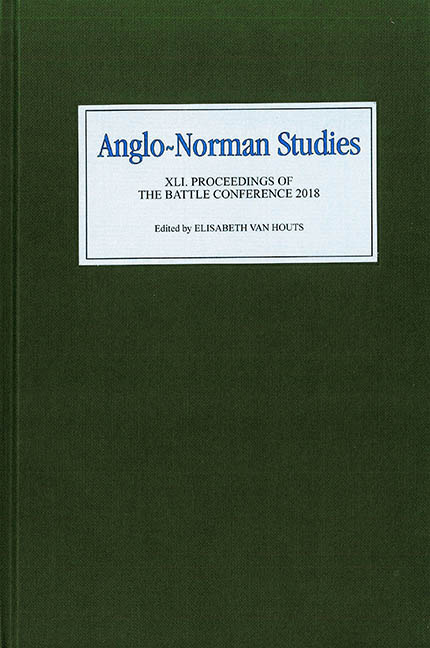Book contents
- Frontmatter
- Contents
- Illustrations and Tables
- Editor's Preface
- Abbreviations
- Horses, Knights and Tactics (The R. Allen Brown Memorial Lecture, 2018)
- Baldwin of Forde, Bartholomew of Exeter and the Authorship of the Liber de sectis hereticorum et orthodoxe fidei dogmata
- Evidence of the Ordinary: Wives and Children of the Clergy in Normandy and England, 1050–1150
- Anthropology, Feud and De obsessione Dunelmi
- New Archaeologies of the Norman Conquest
- An Angevin Imperial Context for the Amboise–Anjou Narrative Programme
- The Noble Leper: Responses to Leprosy in the Twelfth and Thirteenth Centuries
- Royal Taxation and Written Record in Eleventh-Century England and Ninth-Century West Francia
- Early Royal Rights in the Liberty of St Edmund (The Marjorie Chibnall Memorial Essay, 2018)
- Castle Construction, Conquest and Compensation (The Christine Mahany Memorial Lecture)
- Four Scenes from the Chanson de Roland on the Façade of Barletta Cathedral (Southern Italy)
- ‘The Jews are our Donkeys’: Anti-Jewish Polemic in Twelfth-Century French Vernacular Exegesis
- Miscellaneous Endmatter
Anthropology, Feud and De obsessione Dunelmi
Published online by Cambridge University Press: 29 March 2020
- Frontmatter
- Contents
- Illustrations and Tables
- Editor's Preface
- Abbreviations
- Horses, Knights and Tactics (The R. Allen Brown Memorial Lecture, 2018)
- Baldwin of Forde, Bartholomew of Exeter and the Authorship of the Liber de sectis hereticorum et orthodoxe fidei dogmata
- Evidence of the Ordinary: Wives and Children of the Clergy in Normandy and England, 1050–1150
- Anthropology, Feud and De obsessione Dunelmi
- New Archaeologies of the Norman Conquest
- An Angevin Imperial Context for the Amboise–Anjou Narrative Programme
- The Noble Leper: Responses to Leprosy in the Twelfth and Thirteenth Centuries
- Royal Taxation and Written Record in Eleventh-Century England and Ninth-Century West Francia
- Early Royal Rights in the Liberty of St Edmund (The Marjorie Chibnall Memorial Essay, 2018)
- Castle Construction, Conquest and Compensation (The Christine Mahany Memorial Lecture)
- Four Scenes from the Chanson de Roland on the Façade of Barletta Cathedral (Southern Italy)
- ‘The Jews are our Donkeys’: Anti-Jewish Polemic in Twelfth-Century French Vernacular Exegesis
- Miscellaneous Endmatter
Summary
The corpus of evidence for Anglo-Saxon history contains only one narrative of an extended real-life feud. In its most detailed form it appears in a short tract known to historians as De obsessione Dunelmi. The story begins with events that may have taken place in 1006. Uhtred of the House of Bamburgh, the ruling family of the English region north of the River Tees, won a great victory against a Scottish army which had besieged Durham. After mounting the heads of the slain Scots on stakes around Durham's walls, he was summoned south to meet King Æthelred II and rewarded with an earldom that encompassed not just his family's northern heartlands but also what had, until the expulsion and killing of Erik Bloodaxe in 954, been the Scandinavian kingdom of York. Driven, perhaps, by the need to secure local allies in order to rule this region, Uhtred dismissed his first wife – Ecgfritha, daughter of the bishop of Durham – and instead married the daughter of a prominent Yorkshire nobleman named Styr. Styr, however, had a condition for the match: Uhtred was to kill his enemy, Thurbrand the Hold. But Thurbrand struck first. As England succumbed to Scandinavian conquest in the mid-1010s, Uhtred (as De obsessione tells it) remained staunchly loyal to King Æthelred, whose daughter had by this point become his third wife. However, in 1016, once Æthelred had died and Cnut had seized the throne, he had little option but to submit. Having secured safe-conduct from Cnut he travelled to the king's hall and entered his presence, whereupon, apparently as a result of Thurbrand's unspecified treachery, the king's soldiers sprang from their hiding place in a curtained-off section of the hall and slaughtered Uhtred and the forty men who accompanied him.
The next act in the drama is disappointingly vague: after a brief interlude Uhtred's earldom, now shorn of Yorkshire, passed to his son Ealdred, who killed Thurbrand in circumstances which are left obscure. Following this De obsessione provides more detail. There was a prolonged period of hostility in which Earl Ealdred and Carl, Thurband's son, made efforts to ambush and kill one another.
- Type
- Chapter
- Information
- Anglo-Norman Studies XLIProceedings of the Battle Conference 2018, pp. 59 - 82Publisher: Boydell & BrewerPrint publication year: 2019



